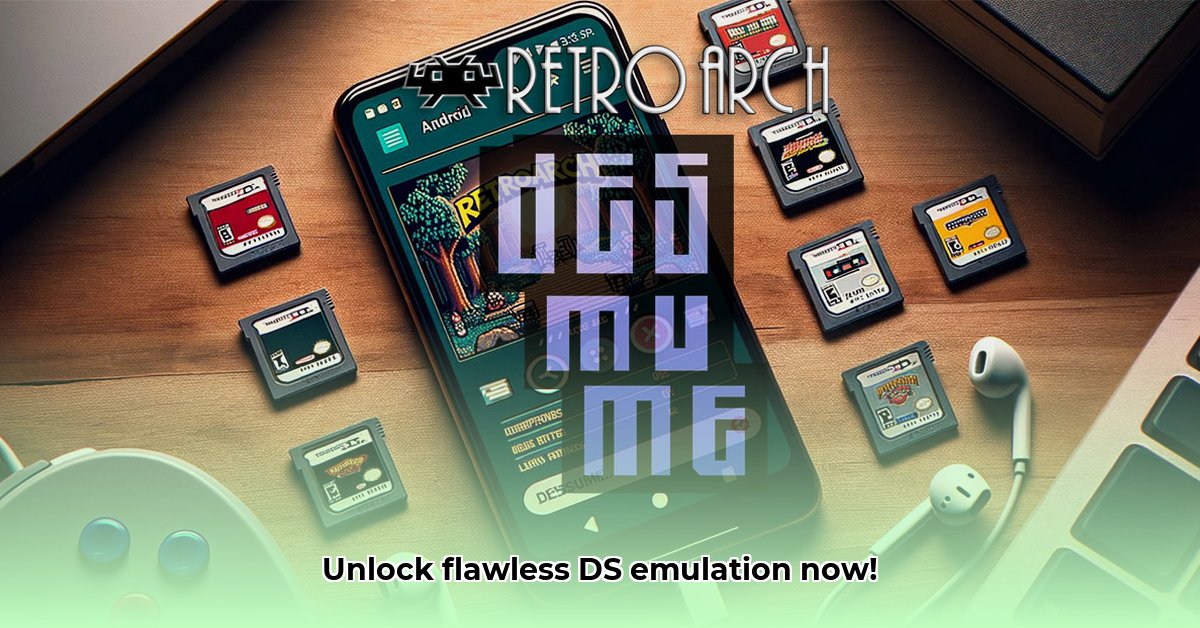
Want to relive the magic of Nintendo DS gaming on your PC? This guide provides a step-by-step walkthrough for downloading, installing, and optimizing the DeSmuME core within RetroArch, maximizing your emulation experience. We'll cover everything from basic setup to advanced configuration, ensuring you can play your favorite DS titles smoothly and efficiently.
Downloading and Installing the DeSmuME Core: A Secure Approach
First, you need the DeSmuME core. Always download from the official RetroArch online updater 1. This guarantees a clean, malware-free version. Downloading from unofficial sources risks compromising your system’s security. After downloading, the installation process is straightforward:
Locate the Core Directory: Open RetroArch and navigate to the settings or configuration menu. Find the option relating to cores or core downloads (the exact wording depends on your RetroArch version). This menu will reveal the path to your core directory. This is where you'll place the downloaded core.
Install the Core: Copy the DeSmuME core file (usually a
.zipor similar) and paste it into the core directory. Restart RetroArch to activate the newly added core.
Configuring the DeSmuME Core: Fine-Tuning for Optimal Performance
This section covers essential DeSmuME settings and their impact. Experimentation is key! What works best will depend on your system's specifications and the specific game you're running.
| Setting Category | Setting Name | Description | Impact |
|---|---|---|---|
| CPU Emulation | CPU Mode (JIT/Interpreter) | JIT (Just-In-Time compilation) generally offers faster speeds but might cause compatibility problems. Interpreter mode provides better compatibility but reduced speed. | Speed vs. Compatibility: JIT prioritizes speed, Interpreter ensures broader game compatibility. |
| CPU Emulation | JIT Block Size | Controls the amount of code the JIT compiler processes at once (JIT mode only). Smaller blocks improve stability, though at the cost of speed. | Stability vs. Speed (JIT Mode Only): Smaller blocks are safer; larger ones are faster. |
| Video | Resolution/Scaling | Higher resolutions provide sharper visuals, but significantly impact performance. | Visual Quality vs. Performance: Higher resolution improves visuals but decreases performance. |
| Video | Frame Skip | Skips frames to improve speed; however, this can lead to jerky gameplay. | Smoothness vs. Speed: Higher frame skip increases speed but results in less smooth gameplay. |
| Audio | Audio Rate/Output | Higher audio rates improve quality; however, this can strain your system. | Audio Quality vs. Performance: Higher rates deliver better quality but might negatively affect performance. |
| Advanced | Advanced Timing Options | More accurate emulation, requiring more processing power. | Accuracy vs. Performance: Higher accuracy will generally reduce performance. |
Remember: The 'best' settings are game- and hardware-dependent. Experiment to find the optimal balance. Isn't this iterative process a fascinating part of the emulation experience? Do you find tuning these settings as rewarding as the gameplay itself?
Troubleshooting Common Issues: Addressing Potential Problems
Even with careful configuration, problems might arise. Let's address some common issues:
Game Crashes/Freezes: Switching to Interpreter mode often resolves crashes caused by JIT instability. Adjusting the JIT Block Size (if using JIT) might also help.
Sluggish Performance: Reducing resolution, increasing frameskip, or lowering the audio rate can boost performance. Consider the trade-offs in visual and audio fidelity. Have you considered adjusting the CPU mode?
Audio Glitches/Distortion: Adjusting the audio rate or output method might resolve sound problems.
Visual Glitches: Lowering the resolution or tweaking scaling settings may fix visual artifacts.
BIOS Files: Ethical and Legal Acquisition
Some DS games require a BIOS file (system files needed for boot-up). Obtain BIOS files legally; backing up your own BIOS is the only ethical and legal method. Downloading BIOS files from untrusted sources is illegal and risky.
Conclusion: Optimizing Your DeSmuME RetroArch Experience
Mastering DeSmuME in RetroArch requires understanding its settings and their impact. Through experimentation and careful configuration, you can achieve a smooth, high-quality emulation experience. Remember always to download from official sources to maintain system security.
⭐⭐⭐⭐☆ (4.8)
Download via Link 1
Download via Link 2
Last updated: Thursday, May 01, 2025